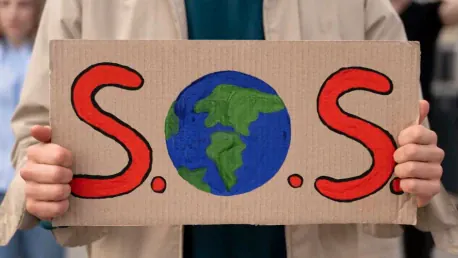The year 2024 has marked a significant milestone in the ongoing battle against climate change. For the first time, global temperatures have surpassed the critical threshold of 1.5°C above pre-industrial levels. This alarming development underscores the intensifying impacts of climate change, characterized by a series of extreme weather events worldwide. The unprecedented rise in global temperatures has sent shockwaves through the scientific community and global policymakers, emphasizing the need for immediate and sustained climate action. This critical threshold breach highlights the urgency of addressing the root causes of climate change and implementing effective mitigation strategies to protect the planet’s future.
Record-Breaking Temperatures in 2024
Scientists and global climate officials have confirmed that 2024 likely exceeded the 1.5°C mark, making it a pivotal year in the context of global warming. This figure is part of a trend observed over the past eleven years, where global temperatures have consistently equaled or surpassed 1°C above the pre-industrial average. Data compiled by the Met Office, University of East Anglia, and the National Centre for Atmospheric Science indicate an average temperature increase of 1.53°C in 2024, with a margin of error of ±0.08°C.
The significance of breaching the 1.5°C threshold lies in its implications for the Paris Agreement, which aims to limit long-term global average temperature increases to below this level to mitigate severe climate impacts. While a single year exceeding 1.5°C does not constitute a breach of the Paris Agreement, it signifies that the margin to avoid prolonged exceedance is narrowing rapidly. Colin Morice from the Met Office emphasizes the critical thinness of the current headroom to maintain the temperature goal. The continuous yearly increments in temperature emphasize the necessity for stronger climate regulations and more robust international cooperation to achieve the desired temperature stabilization.
Human Activities and Rising Temperatures
The rise in global temperatures is closely linked to human activities, particularly the continued use of fossil fuels—coal, oil, and gas—that heighten atmospheric greenhouse gas concentrations. This relentless reliance on fossil fuels prevents the global temperature from stabilizing or declining. The consequence is a steady increase in the occurrence and intensity of extreme weather events, such as the recent UK deluges, cold snaps across US states, and the devastating wildfire in Hollywood hills witnessed in early 2025. These events serve as stark reminders of the immediate impacts of climate change on local and global scales, affecting ecosystems and human livelihoods.
Professor Rowan Sutton from the Met Office Hadley Centre underscores the broader implications of exceeding the 1.5°C mark. While 1.5°C itself is not a definitive tipping point, every fraction of a degree above it significantly exacerbates the frequency and severity of extreme weather events, commits to higher sea levels, and raises the risk of crossing critical planetary thresholds. Such thresholds include the collapse of the Amazon rainforest biome or the melting of ice sheets in Greenland and the Antarctic. The cumulative effects of these changes pose significant threats to biodiversity, human health, and the stability of natural systems that support life on Earth. Addressing greenhouse gas emissions is more urgent than ever to prevent such catastrophic outcomes.
Natural Climate Variabilities and ENSO
Central to understanding fluctuations in global temperatures are natural climate variabilities, notably the El Niño Southern Oscillation (ENSO). ENSO influences year-to-year climate variations, with El Niño phases driving temporary increases in global temperatures, as observed in 2024, while La Niña brings cooler conditions. Although ENSO conditions were neutral during the latter part of 2024, the year still recorded historically high ocean surface temperatures, suggesting significant underlying warming trends. Understanding the interplay between natural variability and anthropogenic influences is crucial for accurately predicting future climate patterns and developing effective mitigation strategies.
The predictions for 2025, which indicate it could join 2024 and 2023 as one of the hottest years on record, add urgency to global climate efforts to curb future warming. This forecast reinforces the call for collective action to address greenhouse gas emissions effectively. The persistent upward trend in temperatures, influenced by both natural and human factors, underscores the need for comprehensive policies and practices to tackle climate change. Nations must prioritize renewable energy sources, enhance energy efficiency, and promote sustainable practices to mitigate future warming and protect vulnerable communities from the adverse effects of climate extremes.
The Urgency of Climate Action
In 2024, a significant milestone has been reached in the ongoing battle against climate change. For the first time, global temperatures have surpassed the critical threshold of 1.5°C above pre-industrial levels. This alarming development highlights the intensifying impacts of climate change, evidenced by a series of extreme weather events occurring worldwide. The unprecedented rise in global temperatures has jolted the scientific community and global policymakers into action, stressing the urgent need for immediate and sustained climate initiatives. The breach of this critical threshold underscores the necessity of addressing the root causes of climate change and implementing effective mitigation strategies to safeguard the planet’s future. Additionally, the rise in temperatures calls for increased global cooperation and commitment to reducing greenhouse gas emissions, transitioning to renewable energy sources, and enhancing climate resilience. This tipping point serves as a stark reminder that the time for action is now, and every effort must be made to protect our environment for future generations.









